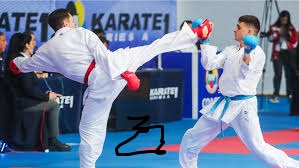Practical Self-Defense
There are misconceptions among some people about using karate techniques, that they are not effective in present day self defense. This misconception is usually observed due to the belief that most classic disciplines pay too much attention to the display of formalized movements rather than their efficiency. But traditional karate moves are very efficient if being used properly in the ring or martial arts competition.
Karate practice involves a set of predetermined patterns of movement (kata) and free-flowing movements in actual combat, (bunkai). While performing a kata, practitioners gain knowledge of how to use every move and the basic idea of how each move can be used when dealing with different kinds of attacks. The focus on stance, timing and distance guarantees that all karate techniques are both forceful and energy sparing.
Accessibility for All Ages
The other myths is that karate is only suitable for young and strong people. This belief can sometimes discourage the older people or physically challenged people from practicing karate training. But, Karate is one of the specific category of the Martial arts that everyone, irrespective of the age and fitness level can practice.
Karate training is very flexible where trainers have to undertake training procedures that meet the needs of the trainees. Those who start learning yoga follow straightforward steps and perform complex steps as they gain muscle strength and self-confidence. The correct form and technique help to guarantee that the practitioners will be able to train oblivious of their conditions.
Karate in Popular Culture
Movies and Television
Iconic Karate Films
Karate is an art that has become imprinted on the popular culture especially in motion pictures. Films that are irresistibly recognizable have placed the art of karate into focus and enthralled people all over the world. Among the classic karate films, one of the most significant ones is “The Karate Kid” film directed by John G. Avildsen in 1984. The plot of the movie is built up around the young boy, Daniel LaRusso, and his master, Mr. Miyagi who teaches him the art of karate. It not only depict different kinds of karate moves but also teaches aspects of discipline, respect, and determination. Since then, “The Karate Kid” has grown into a cultural touchstone in its own right, but for Netflix, it also became the basis for a sequel series, several sequels to the original film, an ill-fated reboot, and of course, the runaway success of Cobra Kai.
Other movies in karate genre includes; Karate Bullfighter (1975) and Karate Bearfighter (1977) both featuring Sonny Chiba. These movies depict the aspect of strength and power of the karate, and come with thrilling and action packed performances.
Karate in TV Shows
Karate has also found its place in television; there are many programs that at least have themes or characters related to martial arts. Cobra Kai’ can be listed among the most popular TV series that often represents karate as one of its major themes. Cobra Kai is a TV series, which is based on the continuation of the “Karate Kid” movie and depicts the fates of Daniel LaRusso and Johnny Lawrence many years after their karate competitions. As noted the series raises such issues as redemption, mentorship and the present day effects of martial arts practice on their lives and relationships. The Cobra Kai has garnered much acclaim for its plot, character progression and numerous Easter eggs that pay homage to the films.
